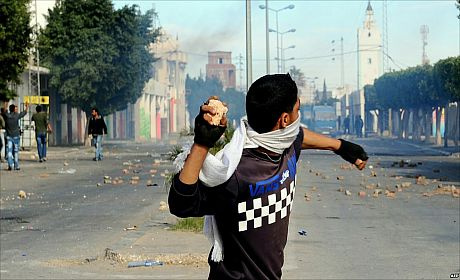Tunisia, Two Years after the Arab Spring

On the second anniversary of the Tunisian revolution which began with the self-immolation of Mohamed Bouazizi, a young disappointed Tunisian, Adel Khedhri, a twenty seven year old young Tunisian, also burnt in the fire of the Tunisian regime with the flames of his poverty and misery. Khedhri set himself on fire to show the protest of young Tunisians against the inappropriate interaction of the government with the economic and living situation of the people in order to keep the memory of Bouazizi’s self-immolation alive. Khedhri’s self-immolation was simultaneous with the vote of confidence to Ali al-Arid and is not a good sign for the new Tunisian government, whose ability to bring the country out of the present crisis many people have great doubts about.
Perhaps the reason behind the existing doubt about the success of the new government in Tunisia is that this government is a conformed copy of the previous cabinet led by Hamadi Jebali, the resigned Tunisian prime minister whose major fault was not taking all active political forces in Tunisia into account. This government is formed by a coalition of only three parties, thus it does not have powerful popular support.
Ali al-Arid, who is now the prime minister in Tunisia and was previously the interior minister, stated on August 21st, 2012 that the Interior Ministry, which is in charge of the security of the Tunisian society, would execute the “state of emergency” law at the appropriate time to fight against security anarchy in the Tunisian cities.
Ali al-Arid’s statement and his emphasis that the police forces have been ordered to use all options to establish security in Tunisia, even if they would have to use warm weapons, was criticized by political parties and groups, including the Tunisian Salafis, as a measure taken by the interior minister to limit public liberties.
Beji Caid el-Sebsi, the head of the “Call of Tunisia” party and a former prime minister of this country who is now among the opposition, has accused the Islamic Ennahda Movement of running the country through its own council.
El-Sebsi considers the al-Arid government to be the same as Jebali’s with the same faces, stating, “The only change has been handing over ministries that govern the country to individuals who are independent from political parties, because if, for example, the Interior Minister is affiliated with a certain political inclination, public opinion in Tunisia would certainly have doubts about the transparency and impartiality of the upcoming parliamentary elections.
He then added, “The Tunisian elite oppose the idea of dividing the society into Islamic, secular, and infidel groups and they state that the people of Tunisia have been Muslims since 14 centuries ago, and we say that democracy necessitates the changing of governments, otherwise it would turn into hegemony.”
He has also stated that he is not against the Ennahda government provided that the Ennahda movement involves others in administering the country and takes advantage of their cooperation, for none of the parties present in Tunisia can run the country by themselves.
The present social situation in Tunisia indicates that from the people’s point of view neither the Islamic, nor the secular or leftist parties have the capability to propose a solution for the crisis in this country, particularly in the economic sector. Even the Tunisian General Labor Union has lost the power and influence it had always had after the independence (1956), when the labor forces rejected the invitation of this union for public strikes.
The economic situation is exerting the most pressure on the Arab Spring societies. Based on statistics published by the International Monetary Fund, the weak economies of countries wherein the Arab Spring occurred need 300 billion dollars within the next two years to be able to pursue their development programs. But many observers believe that not only will the mentioned amount not be provided, but also even the aids promised by superior economic powers to be given to the Arab Spring countries, the amount of which is much less than 300 billion dollars, do not seem achievable.
Some experts believe that in the Arab Spring countries, the dictators were toppled by the people but they have been replaced by public anarchy and these countries are faced with chaos more than ever before. Tunisia is one of these countries where, considering its cultural structure, its proximity to Europe and the dominating French culture in this country, the presence of more than one million Tunisians in France, the considerable percentage of whom are educated elites, the pressure exerted upon its ruling government is more tangible.

